[unable to retrieve full-text content]
No DNA tested needed, this grandkid loves the 'dictionary' Mississippi Valley PublishingMonday, February 7, 2022
Patriotism means more than its definition in the dictionary - Pope County Tribune - Dictionary

Stoneage Ramblings
By John R. Stone
It seems like patriotism is a big thing these days, or has been for the past few years.
My dictionary, an older Merriam Webster, defines a patriot as “one who loves his or her country.”
I can live with that. But I would go a little further. How much does a patriot love his or her country?
Is a person a flag waving, USA t-shirt wearing patriot or a person who loves his or her country enough to actually do something to make it better?
I put our military veterans at the top of the list of people I consider to be patriots. These are people who gave up a portion of their lives, a couple of years or more, and many faced deadly situations because their country asked them to do so.
Others I would put on my patriot list would be people who served in the Peace Corps, Americorps and other nationally supported outreach programs.
These people didn’t get paid much, put their own careers on the back shelf for at least a couple of years, and sometimes risked their lives all so that the image of the United States of America would be projected in a positive way around the world.
They got their hands dirty, they just didn’t sit around in a comfortable room and think lofty thoughts about what others should be doing, they got out and did it themselves.
I think voters are patriotic. An essential part of our democratic process is for the owners of our country, U.S. citizens, to select the leadership they want. They aren’t always going to get what they want, leadership roles go to those who garner the most votes, but they have the right and obligation to express their opinion about who should lead various levels of government in this nation.
I think public officeholders are patriotic if they seek office for the correct reason, that reason being trying to make this country better for all of its citizens.
There are those who could do far better economically in the private sector income wise but who choose public service as officeholders to make our country a place where all can grow and benefit.
I do not consider folks who run to grind axes to be patriots nor do I consider those who seek election to public office as a career to necessarily be patriots. I don’t consider those who seek public office to wield power over others to be patriots. And I don’t consider those elected to office who use the system to their advantage or use their power for personal financial gain to be patriots.
I guess I have a high bar to measure patriotism!
-0-
As we get older it seems we spend more time mourning the loss of people we know.
The most recent in my life and Mary’s is John P. Shea, or JP as most of us knew him.
John actually worked here at the Tribune many years ago for a couple of years in sales before moving on to a bigger, and probably better paying, job at American Solutions for Business.
I bought some cars from JP when he was at Gloege’s and he was a straight shooter. He had a firm handshake, looked you in the eye when he talked to you and did what he said he would do. You could trust him.
He was always one of those people it was a pleasure to be around whether it was in a working situation or after hours. We had some good times over the years whether it was at work, just talking, or after hours. He was just a really good person.
Our condolences go out to Cheryl, David and Patricia along with his brothers, sister and other friends and relatives. Rest in peace, JP.
Thought for the week: “In the end, it’s not the years in your life that count, it’s the life in your years.” Abraham Lincoln
Translation of Peng Shuai’s original social media post - Durham Herald Sun - Translation
[unable to retrieve full-text content]
Translation of Peng Shuai’s original social media post Durham Herald SunTranslation Management Software Market Size to Grow by USD 1.58 billion| Market Research Insights Highlight Exponential Increase in the Volume of Data as Key Driver | Technavio - KPVI News 6 - Translation
[unable to retrieve full-text content]
Translation Management Software Market Size to Grow by USD 1.58 billion| Market Research Insights Highlight Exponential Increase in the Volume of Data as Key Driver | Technavio KPVI News 615 Fantastic Books From Southeastern Europe Available in English Translation - Book Riot - Translation
When I was in college, I found myself in a Balkan Folklore course. It would change my regional focus — I would end up writing my senior thesis about a book by Milorad Pavić, and the professor of that course became my advisor. So I was particularly excited to read the stack of books I brought home for consideration for this list. I dug deep into my research, and ended up with 13 amazing reads for your consideration — and discovered a few new all-time favorites.
I used the definition of Southeastern Europe as: Albania, Bosnia & Herzegovina, Bulgaria, Croatia, Kosovo, Montenegro, North Macedonia, Romania, Serbia, Moldova, and Slovenia. I tried to make sure that each country was represented in the list below.
Many of these countries have been through turmoil in the past century. After Yugoslavia broke up in 1991, new borders were drawn and secessions, violence, and new political regimes criss-crossed the region. The shift into nation-building, into questions of language and memory, into trying to make sense of violence and politics, sparked a new push in national literature, a resurgence that led to new novels in Croatian, Serbian, Romanian, Bulgarian, and more.
These countries (of about 12.5 million people) are connected by region, but they’re made up of a huge mosaic of cultures, ethnicities, languages, and, of course, literatures. Yet many of the modern authors from these countries remain relatively unknown, and too few books from the region made their way to us in English translation. In addition, not nearly enough authors of color from the region have been translated.
I also want to take a moment to mention that the Romani oral and written traditions are vital for understanding the literature of the Balkan region. But in all my research, I wasn’t able to find available English translations of Balkan Romani works, despite the work of authors such as Jovan Nikolić, Alija Krasnići, Lilyana Kovatcheva, Akile Eminova, and Georgi Parushev. There are translated versions of these works, just not yet into English, or not available in English.
Please note that while I took great care to list content warnings where I could, sometimes things fall through the cracks. Please do additional research on the recommended titles if needed.
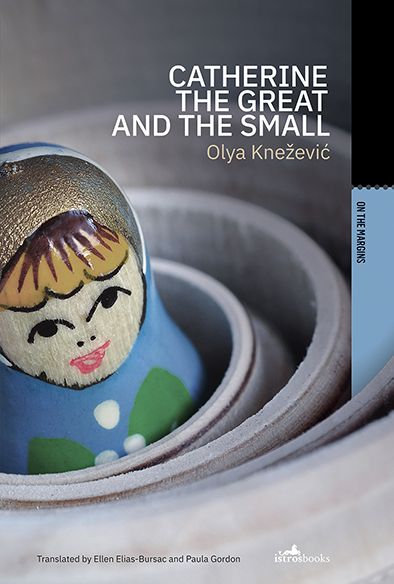
Catherine the Great and the Small by Olja Knežević, Translated from Croatian by Paula Gordon and Ellen Elias-Bursač
This novel focuses on a close sisterhood and friendship, often destructive. Catherine is coming of age in 1970s Titograd alongside her dear friend Milica, a talented, bold aspiring actress, and her crush, a future football star. But as they grow up, things change. Milica falls into the wrong habits. Her crush is long gone. Catherine is trying to stay afloat as she grows, as trauma and bitterness inflect the edges of who she is. It’s a compelling novel about motherhood, pain, and a close friendship that reminded me of the fraught dynamic between Elena and Lila in Elena Ferrante’s Neapolitan novels.
Content warnings for terminal illness and parental death, G-slur, sexual harassment and assault, toxic relationships, substance abuse, alcoholism, suicidal ideation.
Sworn Virgin by Elvira Dones, Translated from Italian by Clarissa Botsford
On the eve of her grandfather’s death, in a desperate attempt to retain her autonomy amidst the strict gender essentialism of northern Albania, Hana takes advantage of an ancient and rare custom: she will become a man, with all of its privileges, rights, and protection. In exchange, she must remain a virgin, or her rights are revoked. Now, Hana is moving to the U.S. to start over in the house of her cousin, but she has a complicated relationship with her gender and body after years of living as a man. This novel is a brilliant satire that uses absurd contradictions to poke holes in the gender essentialism and heteronormativity of our world.
Content warnings for gender essentialism and sexism, fatphobic and ableist language, and rape attempt.

A Spare Life by Lidija Dimkovska, Translated from Macedonian by Christine E. Kramer
Zlata and Srebra are conjoined twins, connected at their heads. Their life in Skopje is often difficult — they are treated poorly, isolated, and their family doesn’t have much. The two girls have very different hopes for the future, and both often dream about the day that they’ll somehow find the money that could allow them to get surgery to be separated. The older they grow, the more they despair of the possibility — and when Srebra decides she wants to get married, it threatens their already fragile stability. In this metaphor for the transformation of Macedonia, Dimkovska writes a long, tightly woven story about identity and what it means to have independence.
Content warnings for alcoholism, ableism, sexual harassment, R-slur, G-slur and anti-Romani sentiment, suicide, and young death.
Everything Happens as It Does by Albena Stambolova, Translated from Bulgarian by Olga NIkolova
In this strange, surreal novel, a twisting family story unfolds in a web of stories and timelines. Boris is a young, strange boy in the Bulgarian countryside who feels most at home coated in bees; Phillip is a pathologist who stumbles one day on Maria, an enigmatic woman with fog in her eyes; Valentin and Margarita are their twins, both identical and eerily different. Out of them all, Stambolova weaves a story of images and surrealist strangeness, with Maria and her magic at its center. People who can’t stand to see loose ends dangle will be driven wild by this book — people who enjoy a healthy dollop of ambiguity and implied supernatural-ness will fall in love.
Content warnings for child death, parental death, G-slur.
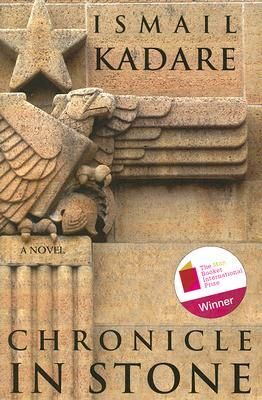
Chronicle in Stone by Ismail Kadare, Translated from Albanian by Arshi Pipa
A young boy grows up in Gijrokastër, Albania, a steep stony city that was under Italian or Greek control — often changing hands — and eventually occupied by Germans, all between 1939 and 1944. The novel by Albanian novelist Kadare is a beautiful, often funny, surreal book about years of life in the city as told by a child. He doesn’t understand much of what he hears and sees, which adds an ironic gloss to it all: from the coded language around gender and sexual subversion to the old-fashioned town’s fears of magic to the way he falls in love with the airplanes, not understanding why the adults discourage his love for the aerodrome. It’s a very well-written historical fiction novel with a lot of heart — a novel where the city itself is alive.
Content warnings for violence, homophobia, sex shaming, murder, fatphobia.
18% Gray by Zachary Karabashiliev, Translated from the Bulgarian by Angela Rodel
This Bulgarian bestseller was finally translated into English in 2013. In Karabashiliev’s novel, Bulgarian émigré Zack goes to Tijuana after the sudden and distressing disappearance of his wife. In the city, he tries to intervene to save a stranger’s life, only to end up fleeing to the U.S. in a van that apparently is carrying quite a bit of weed. This event jumpstarts a road trip across the U.S., as Zack flees his own past. He photographs the U.S., speed-bumps over unexpected, often dangerous detours, and endures flashbacks as he has conversations with his missing, beloved Stella.
Content warnings for violence, paranoia, shooting, xenophobia.
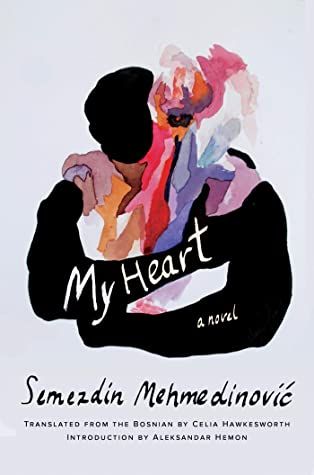
My Heart by Semezdin Mehmedinovič, Translated from Bosnian by Celia Hawkesworth
In this autobiographical novel, Bosnian author Mehmedinović writes about the events that unspool after his first heart attack, up until and continuing after his wife’s stroke. What might sound bleak is actually rich with love: it’s a story about memory and the way the two support and hold up each other through their times of need. He also takes a chance to highlight the painful inadequacy of hospitals and the impersonal care they give that too often neglects the emotional and mental needs of their patients.
Content warnings for passing suicide mention, heart attack/stroke, hospitalization, Islamophobia / xenophobia, PTSD and trauma.
The Appointment by Herta Müller, Translated by Michael Hulse and Philip Boehm
Müller won the Nobel Prize for Literature in 2009 for her books on life in Romania under dictator Nicolae Ceaușescu. In The Appointment, a young girl working in a clothing factory in Bucharest is called in for questioning: she has been sewing notes into the linings of men’s suits, asking the far-off men to marry her so she can escape the country. As she heads to her interrogation, her mind drifts. The stream-of-consciousness story and its beautiful prose richly paint a world of fear and constant dread, touching on the people in her life who have been damaged or killed by the regime.
Content warnings for alcoholism, sexual harassment, deportation, grooming, violence.
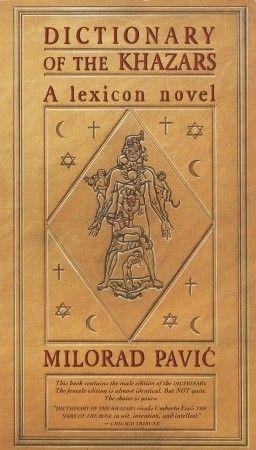
Dictionary of the Khazars by Milorad Pavić, Translated from the Serbian by Christina Pribićević-Zorić
This one might not be for the faint of heart. I wrote my thesis on this strange, wild story: a book about the lost people the Khazars, who may have converted to Judaism, Christianity, or Islam — at the point of their conversion, the story breaks into three books, expressing different stories and opinions representing each religion’s sources and stories. The novel is packed with magic, mysticism, dreams, and destiny — it denies us explanations and challenges what it even means to try and create a single history of a people who were dispersed out into the world, whose own viewpoints have been, perhaps irreparably, lost. There are countless things to discover in its pages.
Encyclopedia of the Dead by Danilo Kiš, Translated from the Serbo-Croatian by Michael Henry Heim
This collection of short stories will appeal to fans of Jorge Luis Borges and other fantastic authors of surreal and fabulist tales. In his haunting, eerie stories, a woman sees her family’s future murder in a dusty mirror; a woman learns about her father from an encyclopedia in the Royal Library of Sweden that chronicles the lives of all everyday people in order to battle inequality; a fictional history of an antisemitic book is outlined, its threats and its power made very clear. The stories are strange and rich.
Content warnings for antisemitism, violence, use of the G-slur.
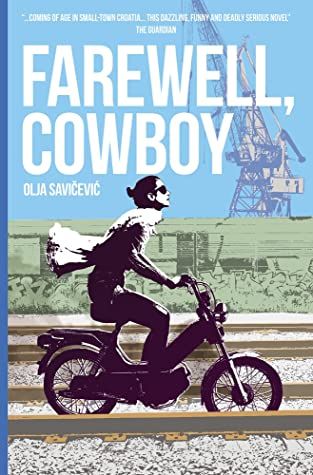
Farewell, Cowboy by Olja Savičević, Translated from Croatian by Celia Hawkesworth
Farewell, Cowboy features a young woman named Rusty who returns to her bleak Croatian childhood neighborhood to care for her mother, who is dependent on substance abuse. She has to cope with leaving her life behind and face her past. The book is one of disillusionment and pain. Rusty unpacks the stories behind her brother’s death by suicide at 18, a death caught up in the violence and anger of the youth in town, which connects back to old obsessions with “cowboys and Indians” and a modern-day western being filmed in town. The translator really worked to keep the slang feel of a lot of the dialogue, and it’s effective.
Content warnings for substance abuse, sexual assault, suicide, grief, anti-Indigenous stereotypes, racist terms and slurs, mental illness, homophobia.
The Cyclist Conspiracy by Svetislav Basara, Translated from the Serbian by Randall A. Major
This strange novel is told completely through fictional historical documents, everything from blue prints to letters to maps. It tells the story of a secret Brotherhood that meets in dreams, contemplating bicycles in order to gain esoteric knowledge. They work to influence world events in ways that are so deeply secret that sometimes they aren’t even certain they’re involved. It’s absurd and wild, a vivid satire of conspiracy theory and secret society stories, and readers who enjoy these sorts of reads that function as both puzzle and self-discovery will love this one. It’s especially relevant as the group questions reality itself, and argues over truth and facts, something that will read frustratingly true.
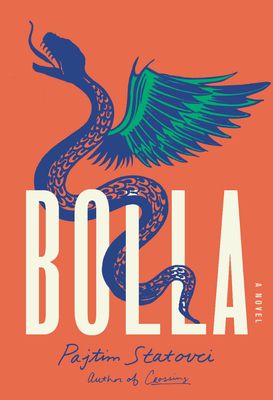
Bolla by Pajtim Statovci, Translated from the Finnish by David Hackston
Arsim is a young married man in Kosovo who falls hard for a young Serbian man named Miloš, who he meets in a café. The problem: Arsim cannot possibly be with Miloš, not for real. And when war breaks out, he and his growing family have to leave Kosovo, propelling him to a new level of darkness. Arsim is not a likable character: in fact, he’s awful, irresponsible and bad to his wife. But it’s a well-written novel, a story about repressed desire, about trauma, homophobia, and its impact. Arsim’s scars reverberate and damage him again and again as he tries to find his way back to Kosovo.
Content warnings for ethnic prejudice, homophobia, xenophobia, domestic violence and abuse, suicidal ideation, rape, ableism, mental illness, and fatphobia.
Before Brezhnev Died by Iulian Ciocan, Translated from the Romanian by Alistair Ian Blyth
These short stories, some interconnected, take place in the Soviet Socialist Republic of Moldavia. In the tales, families struggle with housing crises and deadening poverty in a society that preaches that everyone is doing well and living for their honest work. A pensioner seeks justice for his dead wife, who was crushed by a falling crane. A veteran grates after a kid throws a tomato at his head from above. Country and urban life clash. Cicocan, a novelist and presenter of a Radio Free Europe broadcast about current affairs in the Republic of Moldova, included this book in his trilogy of Moldova, with The Realm of Sasha Kozak and In the Morning the Russians Will Arrive.
Content warnings for suicide, alcoholism, sex shaming, abortion, domestic violence.
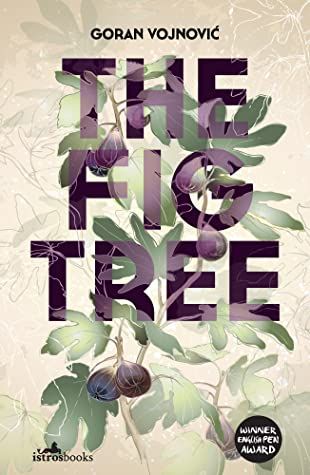
The Fig Tree by Goran Vojnovič, Translated from the Slovene by Olivia Hellewell
The Fig Tree is one of my new favorite novels: a rich intergenerational story rooted by Jadran, a man trying to find his own way in the midst of a family with complicated, tangled roots that extend particularly between Slovenia, Croatia, and Bosnia. As he tells the story of his family and tries to figure out the circumstances of his grandfather’s death, Jadran has to confront the legacy of anger and loss that he’s inherited, the role of memory (is it cruel and bleak, or soft and hazy?), and grapple with whether freedom, in all its solitude and independence, is worth the loneliness that accompanies it. It’s a rich story about love and the stories we tell, that made me tear up more than once.
Content warnings for family death, memory loss / dementia, suicide, alcoholism, fatphobia.
Want more books in translation content? I have lists for you of books in translation from Catalonia, Argentina, France, Mexico, Central Africa, and Japan. If you have recommendations or requests for future lists of books in translation, or if you want me to know about a book I might have missed, let me know on Twitter.
READY, FIRE, AIM: Lost in Translation - Pagosa Daily Post - Translation
Ever since I was in grade school and learned all the semi-English words every schoolboy picks up on the playground, I’ve felt pretty secure in my ability to express myself in my native tongue. The proper English vocabulary taught in the classroom, by our teachers, has also been useful on occasion.
But I recently found out that there are 7,138 distinct languages — other than English — spoken in the world, and many of those languages use words that are difficult, if not impossible, to translate into English.
Some experts feel that a human cannot fully appreciate a sensation and emotion, unless they have a word in their language to describe it.
If this is true, then we Americans can’t really understand how people, who speak other languages, experience the world. This could be a good thing, or a bad thing.
For example. The Bantu word mbuki-mvuki refers to an irresistible urge to remove your clothes while dancing. (Emphasis, I suppose, on the ‘irresistible’ part.) This is a feeling I have never personally experienced, mainly because the English language contains no direct equivalent, but also because I am generally shy about dancing naked, even — I presume — if everyone around me spoke Bantu, and had happily shucked off their clothes.
Another example hits closer to home for me: the German word schadenfreude. Schadenfreude is the experience of pleasure, joy, or self-satisfaction that comes from learning of or witnessing the troubles, failures, or humiliation of another person. I’ve had exactly this experience myself, even though I’ve never tried to find an exact English translation for that word. But my grandfather was German, so maybe it’s inherited.
I’m also fairly sure that my ex-wife Darlene savored feelings of schadenfreude on practically a daily basis, while we were married.
The Inuit people of northern Canada have a word, iktsuarpok, which can be only poorly translated into English, meaning roughly, a sense of intense anticipation while waiting for someone, to the point where you keep going outside to see if they have arrived. To fully appreciate the meaning of iktsuarpok, we need to remember that “going outside to see if they have arrived,” to an Inuit, means stepping out into a raging blizzard at 40 degrees below zero.

Not being an Inuit myself, I would merely glance out the igloo door, now and then, and try to feel contented, chewing some whale blubber.
All of this research into world languages got me thinking about my native tongue (English, mixed with the local vernacular) and about some of the words that we don’t yet have here in America, but which would be useful in describing our feelings, on the odd chance that we wanted our feelings described.
Here are my suggestions for some new American words we could use to communicate our irrepressible urges and feelings of intense anxiety… that people from other lands will have trouble translating.
cybergiggles
A momentary feeling of elation upon learning that the value of your Bitcoin increased by 2% overnight, typically resulting in the purchase of those expensive red tennis shoes you’ve been lusting after on the Zappos website.
avolation
An irresistible urge to squeeze every single avocado in the supermarket bin.
facehooked
A deeply disturbing sense that social media is collecting extremely personal information about you — including your toothbrushing habits, and the color of your underwear — and selling the information to the Chinese.
vaccinsanity
An intense desire, on the part of certain politicians and public health officials, to spend billions of dollars on an experimental chemical mixture, and then try to compel innocent men, women and children to allow the mixture to be injected into their arms.
nostalusion
An inexplicable yearning or nostalgia for the cute girl who sat next to you in high school trigonometry class, who actually couldn’t stand you.
ameriscence
A feeling that only a true American can experience — the feeling that you have been born in the greatest country in human history; that the Founding Fathers created a perfect government (which unfortunately is currently controlled by a bunch of senile criminals); that our free market capitalist economic system provides liberty, justice, and access to wealth for each and every citizen except those who don’t deserve it; and if only every other country could be like America, the world would be an infinitely happier place.
Daily Post readers are invited to use any or all of the above words, free of charge, whenever the need arises. Although I invented them, I feel no ownership. In my humble opinion, ‘feelings’ like anxiety and nostalgia are universal and cannot be ‘owned’ by a single person. If these words help you communicate with the people around you, that will be my just reward.
To anyone who speaks one of the other 7,138 other world languages, I say: Good luck trying to translate these little linguistic nuggets!
Underrated writer Louis Cannon grew up in the vast American West, although his ex-wife, given the slightest opportunity, will deny that he ever grew up at all.
Circle Translations Celebrate 5 Years of Translation Service Excellence - EIN News - Translation

Vainius Paulauskas, CEO of Circle Translations, says, “This milestone is just the start of much greater things to come. What makes us so unique is the ability to provide content that will be fastidiously translated as well as our ability to accurately reshape any contextual medium. We are also happy to discuss price quotas to meet the individual needs of our clientele. It is an honor to be a part of the global community for the past five years and we truly look forward to serving our clients for many years into the future.”
Circle Translations has established itself as a reliable translation agency that has built a strong international clientele by providing a wide variety of services such as:
-Subtitle translation
-Closed captioning
-Data collection
-Annotations
-Technical translation
-Translation and Localization
-Patent Translation Services
With more than 70 million words translated each year, they have placed emphasis on trust and quality--which has proven to be of key importance when working with videos or documents that require translation into a foreign language.
They have a dedicated subtitle translation agency section and are well experienced, producing over 20,000 hours of content each year. Circle Translations differs from most systems and software in that there is a human element behind every single translation. Their team of professionals work studiously to complete projects by hand with a turnaround time of a rapid 24 hours. Transcripts and translation services are provided in over 60 different languages and are supported in a variety of formats—ensuring that they provide an all-rounded service.
Inclusivity is a must in this day and age, translations and subtitles allow for a greater connection between content, its creators, and viewers—allowing people from all walks of life to participate and understand a video across shared platforms regardless of language barriers. It also ensures that the videos reach a wider audience and appeal to viewers on a global scale. With Circle Translations, content creators are able to confidently publish videos that have impeccably translated subtitles in a variety of languages-- catering to a broader audience.
The localization manager at Kilo.Health, a client of Circle Translations, reviewed the company stating: “We always receive a great delivery from Circle Translations; they always meet our deadlines, translations are accurate, they offer great communication throughout the translation process and have great prices compared to competitors.”
Over the past five years, Circle Translations has become extremely well-known and established within the industry– working with startups and established companies such as Electronic Arts, Amazon, and Binance. Companies all over the world put their trust in the translations agency as they have been featured on numerous popular networks such as CBS, NBC, Fox, and ABC.
For more information about Circle Translations and the services provided, individuals can visit their website at circletranslations.com. A free quote from the translation agency can be requested on their website by just entering a few personal details, and a representative will get in touch.
About Circle Translations
Established in 2017, Circle Translations is one of the leading localization agencies in the Baltic states. As a Lithuanian translation agency, they provide top-of-the-line translation services at extremely competitive prices. Boasting clients from all around the world, Circle Translations ensures that the content submitted will be carefully translated at immediate convenience. In addition to high-quality translation, they also provide DTP, proofreading, and editing services. Each aspect of their translating process is meticulously crafted as it is of prime importance to custom tailor the text to their client’s desires.
As a professional translation agency, they ensure that the content that clients receive is culturally appropriate according to the language, region, and target country. With a selection of more than 120 languages, clients have reported a margin of 30% growth in their user base after using their translation services.
Vainius Paulauskas
Circle Translations
info@circletranslations.com
The importance of video subtitles | Circle Translations
You just read:
News Provided By
February 07, 2022, 11:29 GMT
Share This Article
EIN Presswire's priority is source transparency. We do not allow opaque clients, and our editors try to be careful about weeding out false and misleading content. As a user, if you see something we have missed, please do bring it to our attention. Your help is welcome. EIN Presswire, Everyone's Internet News Presswire™, tries to define some of the boundaries that are reasonable in today's world. Please see our Editorial Guidelines for more information.